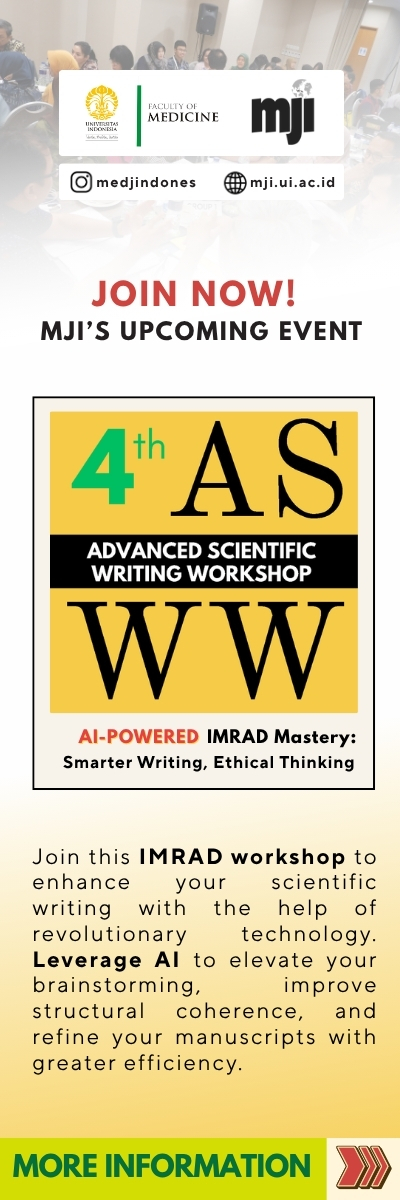Anti-thrombin III, Protein C, and Protein S deficiency in acute coronary syndrome
DOI:
https://doi.org/10.13181/mji.v11i2.54Abstract
The final most common pathway for the majority of coronary artery disease is occlusion of a coronary vessel. Under normal conditions, antithrombin III (AT III), protein C, and protein S as an active protein C cofactor, are natural anticoagulants (hemostatic control) that balances procoagulant activity (thrombin antithrombin complex balance) to prevent thrombosis. If the condition becomes unbalanced, natural anticoagulants and the procoagulants can lead to thrombosis. Thirty subjects with acute coronary syndrome (ACS) were studied for the incidence of antithrombin III (AT III), protein C, and protein S deficiencies, and the result were compare to the control group. Among patients with ACS, the frequency of distribution of AT-III with activity < 75% were 23,3% (7 of 30), and only 6,7% ( 2 of 30 ) in control subject. No one of the 30 control subject have protein C activity deficient, in ACS with activity < 70% were 13,3% (4 of 30). Fifteen out of the 30 (50%) control subjects had protein S activity deficiency, while protein S deficiency activity < 70% was found 73.3.% (22 out of 30). On linear regression, the deterministic coefficient of AT-III activity deficiency to the development ACS was 13,25 %, and the deterministic coefficient of protein C activity deficient to the development of ACS was 9,06 %. The cut-off point for AT-III without protein S deficiency expected to contribute to the development of vessel disease was 45%. On discriminant analysis, protein C activity deficiency posed a risk for ACS of 4,5 greater than non deficient subjects, and AT-III activity deficiency posed a risk for ACS of 3,5 times greater than non deficient subjects. On binary logistic regression, protein S activity acted only as a reinforcing factor of AT-III activity deficiency in the development of ACS. Protein C and AT III deficiency can trigger ACS, with determinant coefficients of 9,06% and 13,25% respectively. Low levels of protein C posed a greater risk of ACS than low levels of AT III. Protein S deficiency was a reinforcing factor on AT-III deficient to development of ACS. The cut-off point of AT-III without protein S deficiency expected to give single vessel disease was 45%, and 9,5% for the development of triple vessel disease. (Med J Indones 2002; 11: 87-92)
Keywords: acute coronary syndrome, Anti-thrombin III, Protein C, Protein S
Downloads
Downloads
Published
How to Cite
Issue
Section
License
Authors who publish with Medical Journal of Indonesia agree to the following terms:
- Authors retain copyright and grant Medical Journal of Indonesia right of first publication with the work simultaneously licensed under a Creative Commons Attribution-NonCommercial License that allows others to remix, adapt, build upon the work non-commercially with an acknowledgment of the work’s authorship and initial publication in Medical Journal of Indonesia.
- Authors are permitted to copy and redistribute the journal's published version of the work non-commercially (e.g., post it to an institutional repository or publish it in a book), with an acknowledgment of its initial publication in Medical Journal of Indonesia.





































